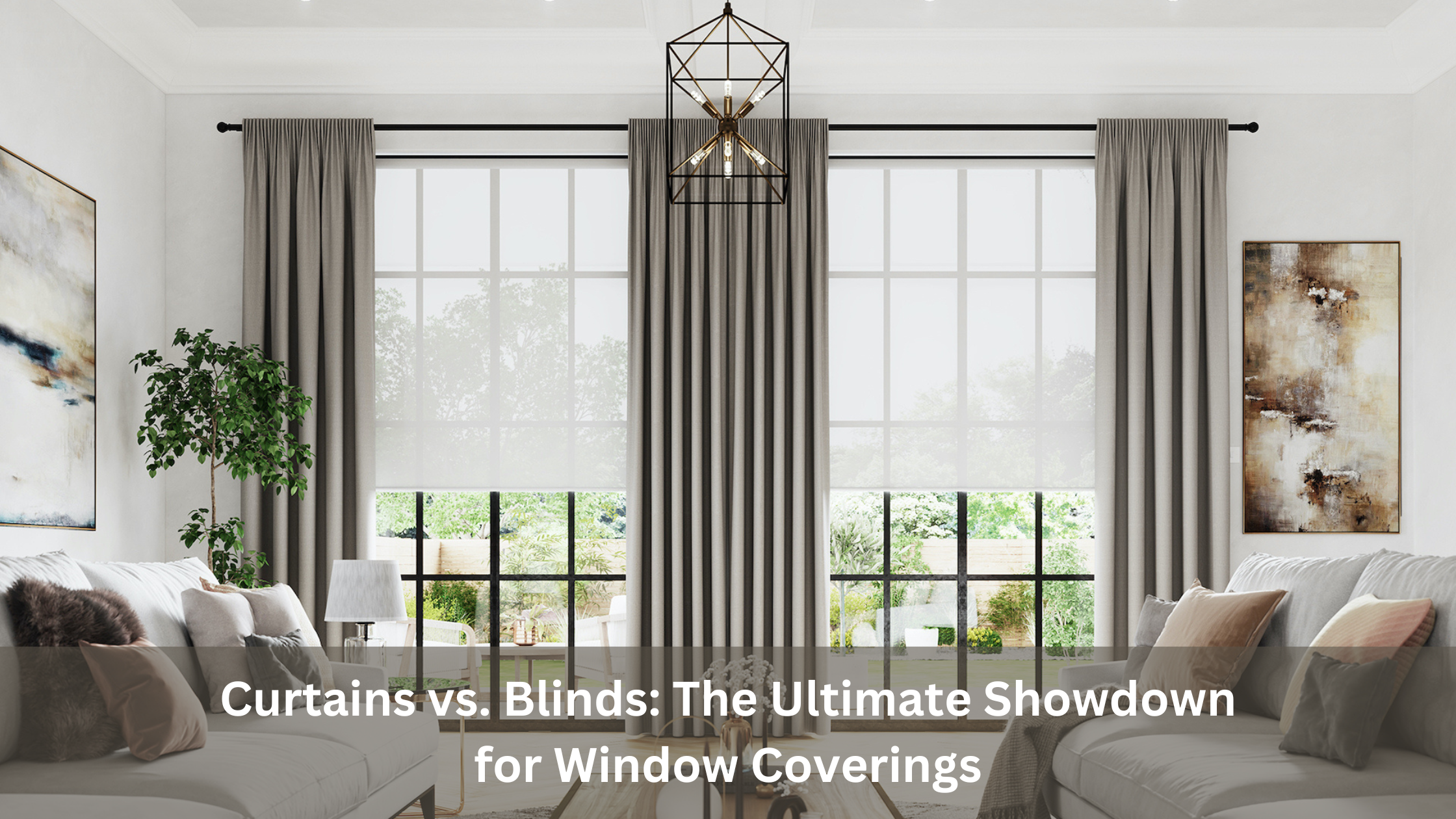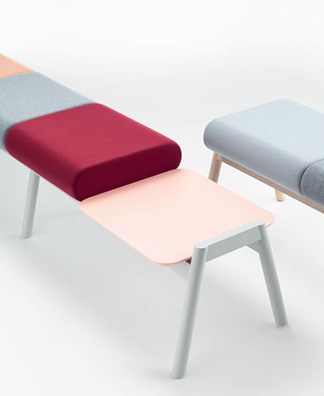Need help deciding between curtains and blinds for your windows?
Choosing the right one can lead to better light control, adequate insulation, and mismatched decor.
Read on for the ultimate showdown between curtains and blinds to find the perfect window covering for your home.
Aesthetic Appeal
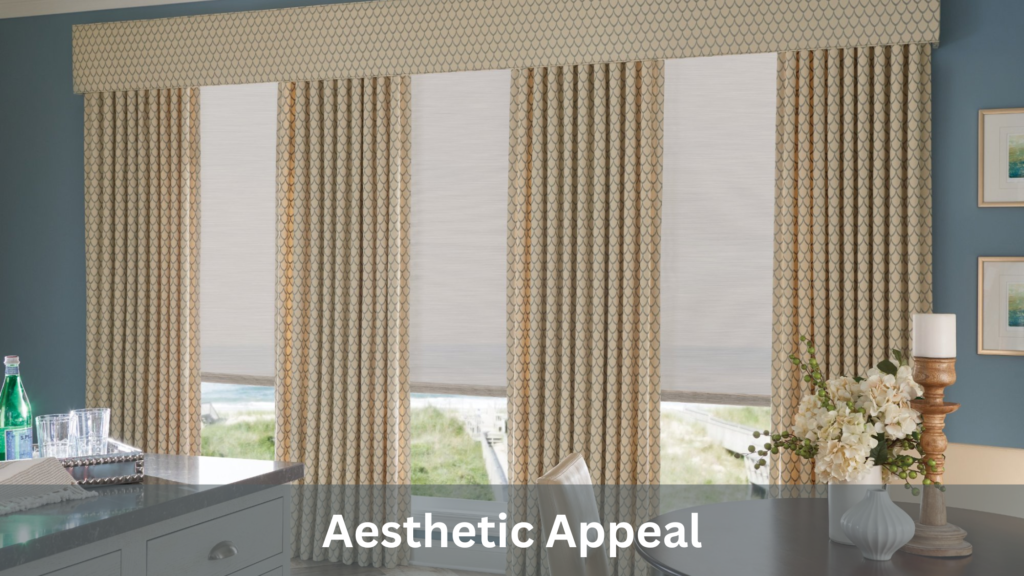
Discover how curtains and blinds can transform your home’s look. Curtains offer versatility with various fabrics and patterns, while blinds provide a sleek, modern design:
When it comes to enhancing the aesthetic appeal of your home, the choice between curtains and blinds plays a pivotal role. Curtains are versatile and available in various fabrics, colours, and patterns. They can effortlessly create a luxurious, elegant look or a cosy, casual vibe, making them suitable for different interior styles.
On the other hand, blinds, with their clean lines and minimalist design, provide a sleek, modern appearance. They are available in wood, metal, and fabric, catering to different tastes and decor themes.
While curtains add a soft, flowing element to a room, blinds offer a more structured and tailored look. Choosing the right window covering depends on your desired aesthetic and the overall ambience you wish to achieve in your living space.
Functionality
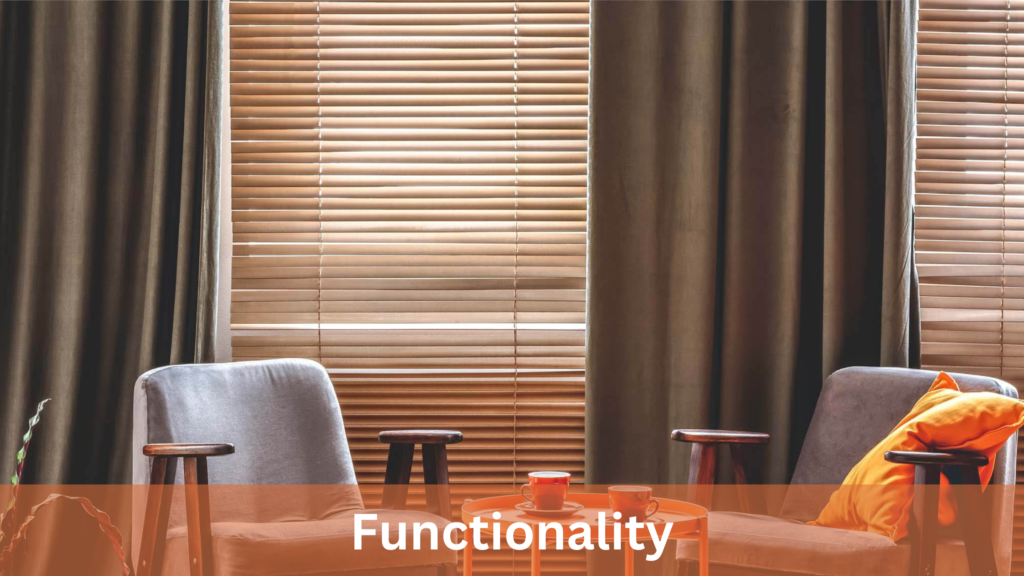
Curtains and blinds each offer unique functional benefits. Curtains excel in insulation and sound absorption, while blinds provide precise light control and easy maintenance. Discover which is suitable for your needs:
Several factors come into play when evaluating the functionality of curtains and blinds. Curtains are excellent insulators, helping to maintain room temperature by preventing heat loss in winter and blocking out heat in summer. They also offer superior sound absorption, ideal for creating a quieter, more peaceful environment.
Blinds, however, provide precise light control with adjustable slats, allowing you to regulate the amount of light entering a room quickly. This feature makes blinds particularly useful for rooms requiring varying light levels, such as offices or living rooms.
Additionally, blinds are generally easier to clean and maintain than curtains, which often require dry cleaning.
While curtains offer enhanced privacy due to their thicker fabrics, blinds can provide adequate privacy when fully closed. Choosing between curtains and blinds will ultimately depend on your specific functional needs, such as insulation, light control, and maintenance preferences.
Installation and Maintenance

The ease of installation and maintenance can make or break your choice between curtains and blinds. Curtains often require professional help and regular cleaning, while blinds are typically DIY-friendly and low maintenance.
Discover the pros and cons of each
Are you curious about which window covering is suitable for you? Dive into the ultimate showdown between curtains and blinds and discover the pros and cons of each.
1. Curtains
Installing curtains often requires professional assistance, especially for heavier or custom designs, to ensure rods are securely mounted and curtains hang evenly. This can be time-consuming and sometimes costly.
Maintenance involves regular cleaning to prevent dust build-up and fabric fading; lighter fabrics can be machine-washed, while heavier or more delicate materials may need dry cleaning.
The advantage of curtains is that they can be easily changed for a fresh look, but this comes with the drawback of higher maintenance and more complex installation requirements.
| Advantages | Disadvantages |
| Professional Look | Complex Installation |
| Easy Replacement | High Maintenance |
| Light Control | Can Accumulate Dust |
| Versatile Designs | May Fade Over Time |
| Insulating Properties | May Require Regular Adjustments |
| Customisable to Room Aesthetics | Potential for Obstructing Views |
| Enhanced Privacy | Can Be Prone to Wear and Tear |
| Softens Room Ambience | May Need Frequent Ironing |
| Can Be Used with Various Hardware Options | Can Limit Natural Light When Fully Closed |
| Budget-Friendly Options Available | May Require Specialized Cleaning for Certain Fabrics |
2. Blinds
Blinds are typically easier to install than curtains and are often manageable as a DIY project with essential tools. They come with straightforward instructions and can be mounted in minutes. Maintenance is minimal; regular dusting or a quick wipe with a damp cloth keeps them clean.
Made from aluminium, vinyl, or faux wood, blinds are incredibly maintenance-free and durable. Their main advantage is their simplicity in installation and upkeep, making them a practical choice for busy households. However, more complex mechanisms in some blinds may require occasional repairs.
| Advantages | Disadvantages |
| DIY Friendly | Limited Aesthetic Change |
| Low Maintenance | Potential Mechanism Issues |
| Excellent Light Control | It may Not Provide Complete Privacy |
| Space-Efficient | Can Be Less Insulating |
| Variety of Styles and Materials | Corded Blinds Can Pose Safety Risks |
| Easy to Operate | Can Be Prone to Dust Accumulation |
| Durable and Long-Lasting | Can Be Difficult to Clean Thoroughly |
| Affordable Options Available | May Require Frequent Dusting |
Cost Considerations
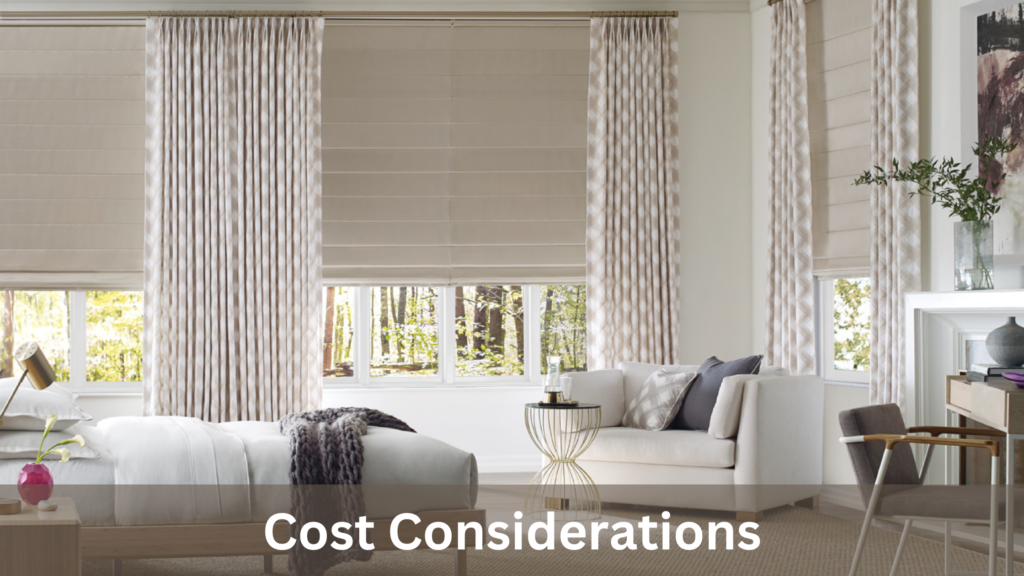
Balancing costs is critical when choosing window coverings. Curtains often have higher initial and maintenance costs, while blinds offer a budget-friendly, low-maintenance solution. Explore the financial implications of each option.
| Aspect | Curtains | Blinds |
| Initial Cost | The cost is typically higher due to fabric, patterns, and customisation options. High-quality materials and custom designs add to the expense. | Generally more affordable, it comes in various materials, from economical vinyl to premium wood. |
| Installation | It often requires professional installation, adding to the overall cost. | Usually, it is more straightforward to install as a DIY project, reducing labour costs. |
| Maintenance | Regular washing or dry cleaning is required, especially for heavier or delicate fabrics, which can be costly. | Low maintenance requires only regular dusting or wiping, making it cost-effective. |
| Longevity | High-quality curtains can last many years but may need more frequent replacement due to fabric wear and fading. | Durable and long-lasting, mainly made from materials like aluminium or faux wood. |
| Customisation | Offers extensive customisation but at a higher price. | Limited customisation options but generally more budget-friendly. |
Pros and Cons
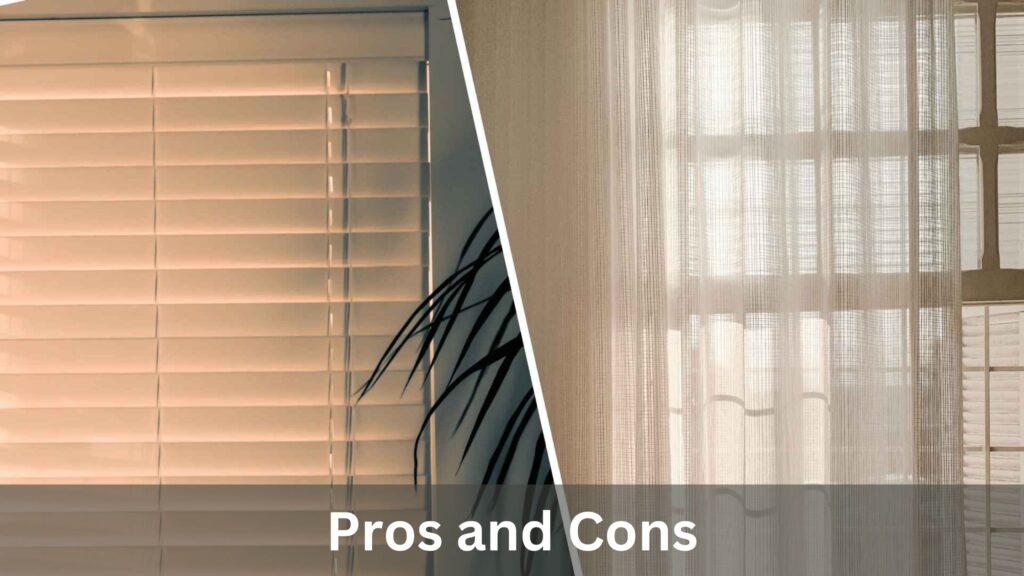
Deciding between curtains and blinds for your window coverings? Here’s a quick rundown of the pros and cons to help you choose the best fit for your home.
| Curtains | Blinds |
| Pros: | Pros: |
| Versatile design options | Precise light control |
| Excellent insulation and sound absorption | Easy to clean and maintain |
| Enhanced privacy | Modern and sleek appearance |
| Cons: | Cons: |
| Higher maintenance needs | Limited design versatility |
| It can look bulky in small spaces | Less effective at insulating compared to curtains |
| Prone to fading and wear over time | It can be noisy if not properly secured |
Conclusion
Choosing between curtains and blinds ultimately depends on your aesthetic preferences, functional needs, and budget. Curtains offer luxury and versatility, while blinds provide simplicity and ease of maintenance.
Evaluate your specific requirements to make the best choice for your home. For high-quality window coverings, visit Into Blinds Melbourne and explore our extensive collection today.

